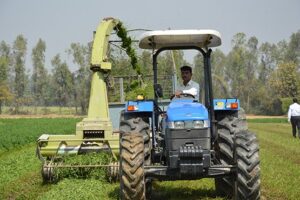Our key operations include Semen production, Fodder production, Bull Evaluation Program, Animal sales and Apiculture. All these activities are targeted to achieve the organization’s objective.
- Semen Production
- Fodder Production
- Fodder Saplings
- Honey
- Vermi Compost
- LN Container Sale
Semen Production
Our core operation is Frozen Semen production & Sales, where we provide high genetic merit bulls’ frozen semen. ABC is committed to producing superior quality frozen semen from high-pedigreed bulls using eco-friendly state-of-the-art infrastructure and an effective Quality Management System. ABC is one of the largest semen-producing station in the country and produced 8.5 million semen doses during 2021-22.
Since its inception, we have made significant progress and a variety of reproductive technologies have become commonplace, with notable effects. Superior gains with frozen semen are accomplished by keeping high genetic merit bulls at the semen stations and providing quality AI semen doses. There is a greater breadth of surveillance for health, biosecurity, resource efficiency, and production maximization.
As a professionally managed semen station that closely complies with the Minimum Standards Protocols (MSP), we have necessary bio-security procedures in place to produce disease-free semen, which is the foundation of any genetic enhancement program. As a result, we manufacture quality frozen semen to assure improved fertility and faster genetic advancement.
Proper disease testing, vaccination and de-worming etc are carried out on a regular basis to prevent infections. For prevention of diseases on the farm, ring vaccination is carried out in all villages falling within a 10 Km radius, covering around 150000 animals.
Artificial insemination has long been utilized as a strategy for quick genetic improvement of the country’s Dairy Animal’s stock. In the current context, where the country is working to close the demand-supply gap for milk, expanded use of AI is critical to improving the productivity of dairy animals in the country. NDDB Dairy Services Semen Stations have played an important role in steering our country to evolve as the top milk-producing nation in the world.
Breeding operations in the country are constrained by operational restrictions, therefore semen production stations must equip themselves with the technology to analyze and process semen so that there is little deterioration in its intrinsic fertility. The cost of producing a high-quality product includes both financial and human resources. As a result, the time has come to create more efficient and effective structures that focus on providing value to the product while minimizing expenses.
Recognizing the contribution of the organization in the production of high-quality bovine genetics, the central monitoring unit constituted by the Department of Animal Husbandry and Dairying (DAHD) has awarded our station, Grade ‘A’ since 2005. The Quality Management Systems at ABC meet the ISO 9001-2015 Standards since 2007 as Certified by the Bureau Veritas Certification of India.
Given the foregoing, our semen production facility attempts to establish and constantly revalidate semen collecting and processing processes that use acceptable viability parameters that are compatible with guidelines. Furthermore, our in-house quality audit and successful application of Quality Management Systems contribute to continuous product and service improvement, resulting in increased customer satisfaction. This guarantees that a high-quality product is continually developed and supplied via careful planning and execution.
Fodder Production
More than 70% of the Indian population lives in rural regions, and animals are essential for subsistence farming and long-term survival. Climate, topography, physiography, altitude, and other variables have altered the distribution of diverse crop and grass species, which influence both qualitative and quantitative fodder and forage output.
ABC holds 241 acres of land, out of these 193 acers of land is utilised exclusively for fodder production to meet the nutrient requirement of animals and to produce/multiply fodder seed. A total of about 193 acres of irrigated land is cultivated for growing different fodder crops like sorghum, maize, lucerne, berseem, cowpea, sugar beet etc. to cater to the requirement of good quality roughages for the herd around the year.
To fulfil demand during the lean season, fodder crops are conserved as silage and hay. An animal production system’s economics and viability are heavily reliant on its fodder production programs. Despite the obstacles given by severe climate, soil, and water salinity, improved resource management and agricultural mechanization have resulted in an increase in fodder output.
Almost all of the processes at our farm are mechanized, including ploughing, seedbed preparation, fertilizer broadcasting, inter-cultivation, harvesting, and cutting of green fodder. In contrast, watering of fodder crops is done with sprinklers and rain guns, which helps to save water.

Fodder Saplings
Honey
Vermi Compost
LN Container Sale

